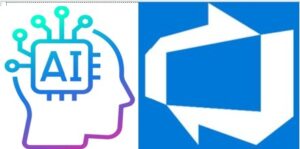
Recently, I wrote an article on “AI & DevOps Predictive Analytics”, and in process, I realized that many people may have mistakenly equate ‘DevOps’ with Azure DevOps. Let me clarify that they are not the same. DevOps is a set of practices and cultural philosophies aimed at fostering collaboration between development and operations teams, whereas Azure DevOps is a (Proprietary) cloud-based platform offered by Microsoft that provides tools and services to implement DevOps practices. In essence, Azure DevOps is a tool that facilitates DevOps, yet it is not DevOps itself. To help clear up this confusion, I decided to write about “How AI Enhances Azure DevOps.” This article explores how Artificial Intelligence (AI) is revolutionizing the way software development and operations teams manage applications, automate processes, and optimize performance. In the Azure DevOps ecosystem, AI plays a crucial role in streamlining Continuous Integration/Continuous Deployment (CI/CD), enhancing security, improving monitoring and observability. In Short AI enhances Azure DevOps by driving efficiency, reducing manual effort, and enabling proactive issue resolution, as is explained in my presentation:
AI-Powered Code Review and Quality Assurance – One of the most significant applications of AI in Azure DevOps is intelligent code review. AI-driven tools such as GitHub Copilot and Azure’s AI-assisted development Enviro provide code suggestions, detect vulnerabilities, and improve code quality – AI-powered static code analysis tools scan repositories to identify bugs, security flaws, & optimization opportunities before deployment – (AI) Machine learning models analyze historical code patterns to predict defects and suggest best practices for improvement.
Intelligent CI/CD Pipelines – AI optimizes CI/CD pipelines, it predicts failures, improves test efficiency, and automate decision-making – AI-driven analytics predict potential build and deployment failures, allowing teams to take preventive actions. AI enables automated rollback strategies when anomalies are detected in Prod, it also reduces downtime a positive impact for users – AI adjusts deployment strategies based on real-time data, which ensures smooth releases with minimal disruptions.
AI in Testing Automation – AI enhances software testing as it automates repetitive tasks and identify high-risk areas in codebase – AI identifies unreliable tests that may produce inconsistent results, it also suggests fixes – AI-driven analytics rank test cases based on likelihood of failure, allowing teams to focus on critical tests first – Additionally, it dynamically updates test scripts to adapt to UI and API changes, reducing maintenance overhead.
AI for Security & DevSecOps – Security is a key concern in DevOps, AI strengthens defenses by providing real-time threat detection & automated security compliance – AI integrates security tools such as, Azure Security Center to detect vulnerabilities and potential attack – It also provides Anomaly Detection by analyzing logs and traffic patterns to identify suspicious activities before they escalate – AI enforces security policies across DevOps workflows, it also ensures that deployments comply with regulatory requirements
AI in Infrastructure & Monitoring – AI-driven observability enables proactive monitoring, predictive maintenance, and automated performance tuning
